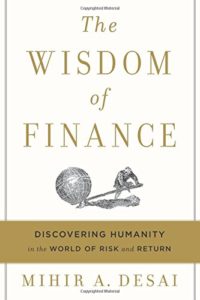We are smack dab in the middle of July. High school and college graduations have already happened. What should we say to those high school graduates who are off to college next month seeking a finance/business degree? What should we say to those college graduates off to a Wall Street analyst program or MBAs off to a private equity or venture capital shop?
Instead of going off on them for helping to bring down the global economy in 2008 and putting a lid on the subsequent economic recovery, maybe we should congratulate them. They are, in fact, entering a noble profession that at its heart is there to serve society.
As much as we begrudge its power in society, the reality is inescapable — finance plays an enormous role in all our lives and many of us find it deeply interesting and challenging.
The real dilemma posed by careers in finance is why and how some of the people who choose to go into it — including some of our best and brightest — end up behaving poorly. Even those of us who enjoy thinking about finance can see that the practice of finance is broken.

So writes Mihir Desai, author of The Wisdom of Finance: Discovering Humanity in the World of Risk and Return, in a new Harvard Business Review article. The fact is that every profession has its bad actors: religion, medicine, politics, law enforcement, business…the list goes on and on. Finance is no different. The problem isn’t the Bernie Madoffs of the world. The problem is that a wide swath of the industry engages in activities that while strictly legal, are on a deep look unethical.
One need only look at the agonizing long debate over the so-called fiduciary rule. The brokerage industry has fought this rule tooth and nail. The ferocity is surprising given how innocuous and straight forward the rule appears. In short, should you criticize the actor in a poorly written play? Maybe we should be paying less attention to the superficial aspects of those in the investment advisory world and focus more on their actions.
As you enter a profession, like finance, you need to take responsibility for your own actions. No one else will do it for you. There is plenty of time to second guess your life and career choices. That is the nature of getting older. However don’t let criticism of finance deter you from putting your best foot forward. Desai writes:
So, graduates entering finance, take heart. You will wrestle with deeply interesting problems with very bright people in your careers. We are trusting you with consequential questions – how we save, how we manage risks and how we, as an economy, allocate capital. Hold your head high – but realize that the rehabilitation of a broken industry is your responsibility.
This is important because the vast majority of people today have little interest, and less aptitude, when it comes to their money. Your job is to make their lives a little less complicated so that they can enjoy doing what they do best. As I wrote in an appreciation of Desai’s book:
Finance is about buffeting our lives from adverse events and allowing us to take advantage of opportunities as they arise…Finance is meant to serve us, not the other way around. Wisdom isn’t about predicting what the stock market will do today, tomorrow or next year. Wisdom is applying the lessons of history to help us lead richer, fuller lives.








